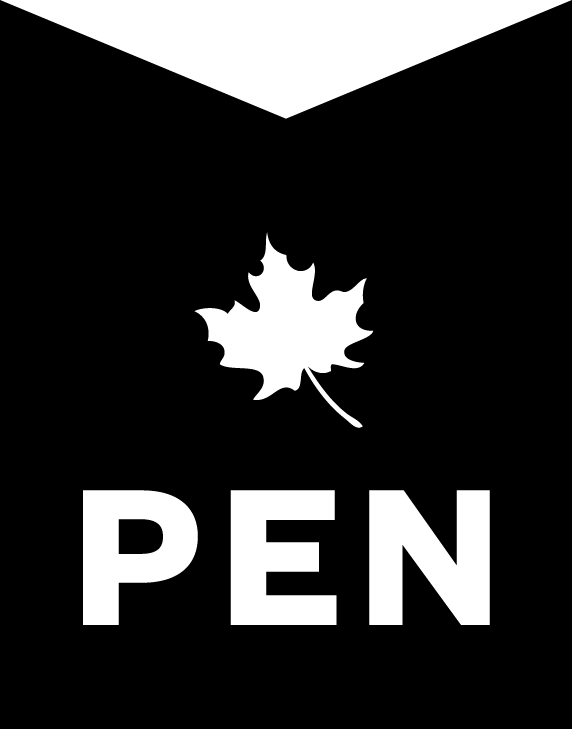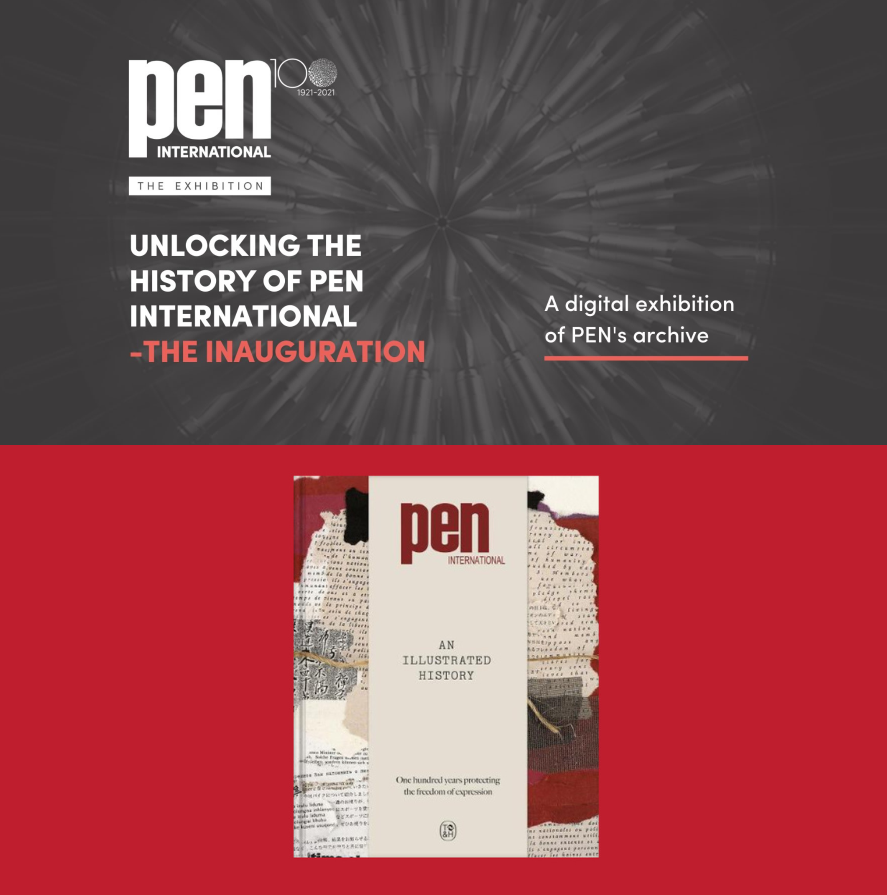History
Part of a global community: PEN International
In 1921 the poet and novelist Catherine Amy Dawson Scott founded English PEN (an acronym for Poets, Playwrights, Essayists and Novelists). Shortly afterwards, with the novelist John Galsworthy, Scott also founded PEN International with the hope that it would:
- foster friendships and understanding between writers from different countries
- enable literature to play a central role in the development of world culture
- empower the creative imagination to defuse the political passions that had led to the Great War
A century later, PEN remains the leading global organization of writers. Its history is retold in the coffee table book, PEN International: An Illustrated History, as well as the online companion PEN100Archive.org.
Today, PEN operates across five continents in over 90 countries, with more than 130 centres supporting the unhampered transmission of thought within each nation and between all nations.
100 years of PEN in Canada, 40 years of PEN Canada
PEN Canada is the Canadian English-language chapter of PEN International.
The first PEN centre in Canada was founded in 1926 in Montreal. In 1983, the English-language centre, PEN Canada, moved to Toronto, while the French-speaking Centre, Centre quebecois du PEN, continued its work in Montreal. Both centres continue to collaborate on various issues.
Since then, PEN Canada has expanded to include journalists, playwrights, publishers, translators, editors and screenwriters, and is one of the most active centres of PEN International.
National Affairs History
In its 40 years, PEN Canada has intervened in a number of landmark legal cases that upheld journalistic integrity and artistic freedom.
It has defended queer bookstores against customs seizures; championed Canadian journalists, columnists, writers and artists who refused to reveal sources or faced legal censure for their work, and it has fought to restore books to classrooms and library shelves.
PEN has also issued hundreds of public statements and opinions on freedom of expression issues and appeared before sSenate to raise concerns about censorious and restrictive legislation.
The Canadian PEN centre split amicably into Anglophone and Francophone groups based in Toronto and Montreal, respectively in 1983. A new base of operations was set up in Toronto in 1984 under the guidance of Constance Beresford-Howe. Margaret Atwood was asked to lead the English-language PEN Canada, and asked Eugene Benson to assist in the set-up.
Initial meetings took place in the homes of PEN members, and a mailing list was created.
An interview conducted by Mariam Botsford Fraser with Eugene Benson gives details on the early days of PEN: The first meeting was held in November 1984, where a constitution was drawn up and some more members were initiated.
The largest congress in PEN history: more than one hundred volunteers and more than six hundred PEN members and special guests from close to 65 countries. Hosted 16 writers under 35, some experimental and many Indigenous- or minority-language writers, from eleven countries and achieved fifty percent representation of women — a first for any PEN congress.
Three years after the Iranian fatwa calling for his assassination, Salman Rushdie made a surprise appearance at the annual PEN Canada benefit in Toronto. Then-premier Bob Rae was the first head of government in the Western world to publicly greet him. The event received international attention and acclaim.
Published by McClelland & Stewart. Writing Away raised over $100,000 for PEN Canada and became the model for two future anthologies. Contributors include: Margaret Atwood, Dionne Brand, Nicole Brassard, Timothy Findlay, Alberto Manguel, Rohinton Mistry, P.K. Page, Nino Ricci, and Judith Thompson.
The Writers in Exile committee established the first writer-in-residency placement at Massey College. Piloted by PEN Canada, the placement program has since been emulated by other PEN centres around the world.
PEN Canada helped to secure the release and immigration to Canada of imprisoned Cuban writer Ismael Sambra, who then took a residency post at York University.
Including (among others): University of Toronto, Banff Centre for the Arts, Toronto Writers Centre, Trent University, York University, George Brown College, Acadia University, University of King’s College, Sheila Copps & Associates, Toronto Metropolitan University (then Ryerson University), City of Owen Sound, Laurentian University, Carleton University, University of Windsor, University of Saskatchewan, University of Guelph.
In partnership with PEN Quebec, PEN Canada called a meeting with institutions from across the country — universities, colleges, fine art museums, libraries — to urge them to host one exiled writer. Delegates from Catalan, German, Norwegian and American PEN centres were present. Within three years, PEN Canada had found placements for 45 writers.
The award honours a writer whose work inspires cross-cultural connections and reflects a courageous belief in the peaceful expression of ideas. Recipients have included Chinese journalist Jiang Weiping, Burmese poet Maung Thura (aka Zarganar), and Mexican author and journalist Lydia Cacho.
PEN helps Chinese journalist Jiang Weiping to relocate to Toronto where his reporting contributes to the downfall of a senior Chinese politician.
Mistry’s first public appearance in over a decade. Sold out, in partnership with the Toronto International Festival of Authors.
The situation was dire: 50 journalists had been murdered in the past five years in Honduras. The trip formed the basis of a PEN Canada special report, Honduras: Journalism in the Shadow of Impunity, and led to the formation of a PEN Honduras centre.
A collaboration between PEN Canada and PEN Honduras, the prize was created to foster investigative journalism in Honduras. Fred Alvarado won the competition with his essay “Honduras: the Process of American Remilitarization and the Failure of the War on Drugs”. After traveling to Toronto for training that was part of the prize, Alvarado claimed asylum when further violence in Honduras made it too dangerous for him to return.
The Canadian federal department of Immigration, Refugees, and Citizenship (IRCC) announced the creation of an expedited refugee stream for journalists, human rights advocates, and humanitarian workers in 2019, with a target to resettle up to 250 people a year. PEN Canada is one of the local NGOs that can make referrals to this program.
The inaugural event saw award-winning authors Omar El Akkad and Margaret Atwood discuss the moral force of literature.
Mariam Al Zier, a paralegal and immigration consultant, was recognized for her efforts in aiding an exiled Iranian journalist.
Explore the history of PEN International
As part of the celebrations of its Centenary year, PEN International has launched Unlocking the History of PEN International: a Digital Exhibition of PEN’s Archive Collection, which documents the history of the organisation since 1921 through digital and digitised archives. These documents were collected from PEN International and over 90 PEN Centres all over the world.
Published as part of PEN International’s Centenary celebrations, PEN International: An Illustrated History is the extraordinary story of how PEN has placed the celebration of literature and the defence of free speech at the center of humanity’s struggle against repression since 1921.
The book takes the reader through the key moments of PEN’s history over the last 100 years, in 320 pages and more than 500 pictures, letters, documents, posters and maps.


